If your contracts feel disorganized, they probably are. Delayed signatures, unclear terms, and scattered files slow everything down. And when the volume picks up, so does the risk of missed obligations and massive financial losses.
AI contract management changes how you handle all of it. Instead of reacting to contract issues as they arise, you get a system that keeps everything in motion.
But how do you choose the right contract management solution? One that fits your team, your workflows, and your appetite for automation? The options can feel overwhelming, especially when every platform claims to do it all.
In this guide, we'll cover how AI tools work across the contract lifecycle, why they’re gaining traction, and which software stands out in 2026.
Contract management used to be a slow, manual process. Teams spent hours searching email threads, updating spreadsheets, and chasing approvals. Even simple agreements could get stuck in limbo, delayed by backlogs or missed follow-ups.
That old way made it hard to move quickly, and even harder to keep track of everything. But now that AI contract management software exists, you can transform your current system from top to bottom.
Using artificial intelligence, this type of software understands legal language, detects risks, and follows the steps your contract needs to move forward. Tasks are assigned automatically. Key terms are flagged in real time. If something’s missing or off-track, you find out right away.
Behind the scenes, tools like natural language processing and machine learning do the heavy lifting. They read, organize, and interpret documents at scale, faster than any human team could.
And because these tools learn from your own decisions and templates, they get more accurate the more you use them.
By now, the benefits of automation in legal work probably seem pretty obvious. But when it comes to managing the entire contract lifecycle, it’s worth delving deeper.
Basically, AI contract management tools can change the way contracts move through your organization, from first draft to final signature.
Here’s what that really means in practice:
If you’re ready to make that shift, here’s a look at some of the best AI contract management software options available right now.
Not every AI tool is built the same, and choosing one often comes down to how well it fits your workflow. We’ve handpicked the top AI contract management tools of 2026 to help you compare the most important parts:
Aline is an AI-powered contract management platform that handles the full contract lifecycle with speed, consistency, and accuracy. From contract redlining to e-signatures to AI-powered analytics, Aline brings every step into one clear workflow to streamline contract management.

The platform centers around Aline AI, its legal-grade engine for drafting and redlining. And with AlineSign, you get unlimited electronic signatures.
Meanwhile, Workflows let you coordinate across departments without relying on email threads. And the AI Repository keeps every agreement organized and searchable, no matter how many contracts you're managing.
It’s a full-stack contract management system that’s just as useful for in-house counsel as it is for sales and procurement. With Aline, you don’t have to fight the tool to get work done; you can just do the work.
If you're having a hard time with the time-consuming tasks in your legal workflow, Aline might just be the tool you need in your tech stack. Start your trial today!
ContractPodAi is a contract lifecycle management platform designed for legal professionals who need control and visibility across the entire contract management process. It’s built to help legal teams draft, review, approve, sign, and oversee contracts in one place.

You can analyze contracts at scale, track contract obligations, and move faster through every stage. For growing teams or enterprise legal departments, this structure makes it easier to standardize how work gets done.
Juro is an AI-enabled platform designed to create contracts, manage legal documents, and speed up the contract review process from start to finish.
Legal and business teams use it to simplify workflows, keep tabs on obligations, and reduce friction throughout the agreement cycle.
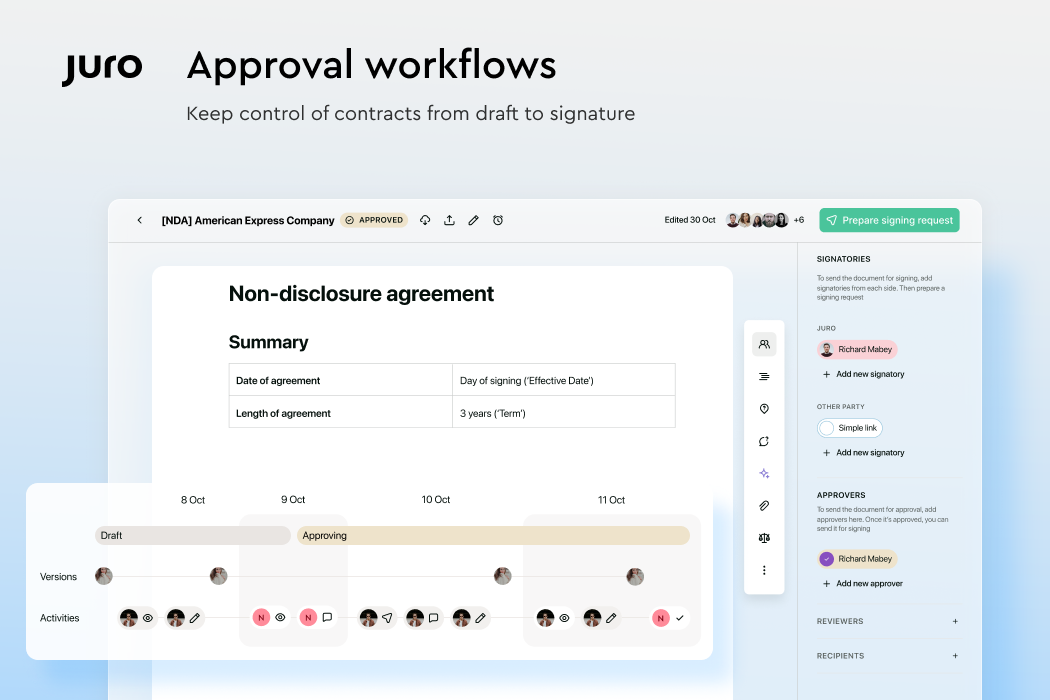
With Juro, you can create business contracts from templates, collaborate with other departments in real-time, and monitor obligations post-signature. Its interface is simple enough for non-legal users, but robust enough to handle complex workflows.
Concord is a contract lifecycle platform that helps users draft, negotiate, and manage contracts. Built with collaboration in mind, it simplifies reviewing contracts, supports version control, and ensures alignment with relevant regulations.
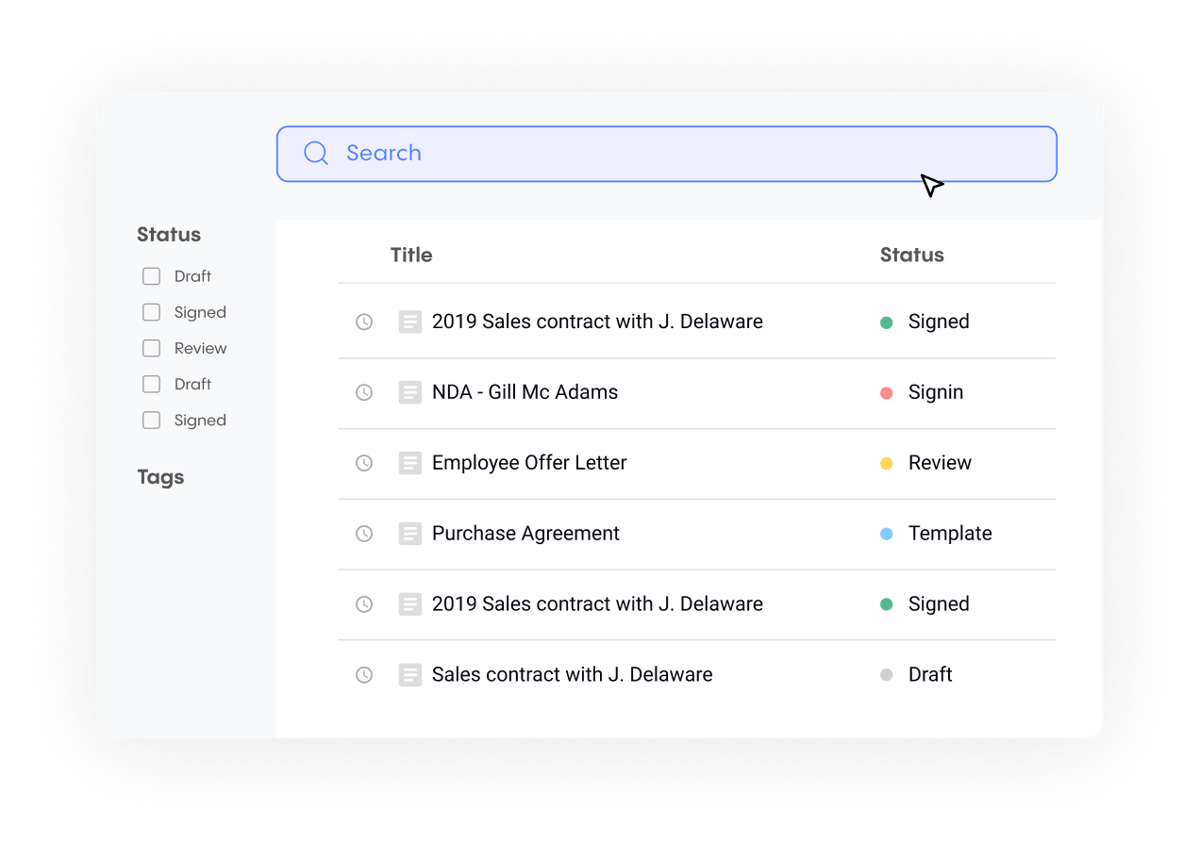
Plus, Concord balances contract automation with human expertise. This gives legal professionals the tools to save time without losing oversight.
DocuSign CLM is a contract lifecycle management solution that lets you take control of complex agreements more easily. If you're already using DocuSign for e-signatures, CLM adds automation, tracking, and collaboration across the full contract lifecycle.
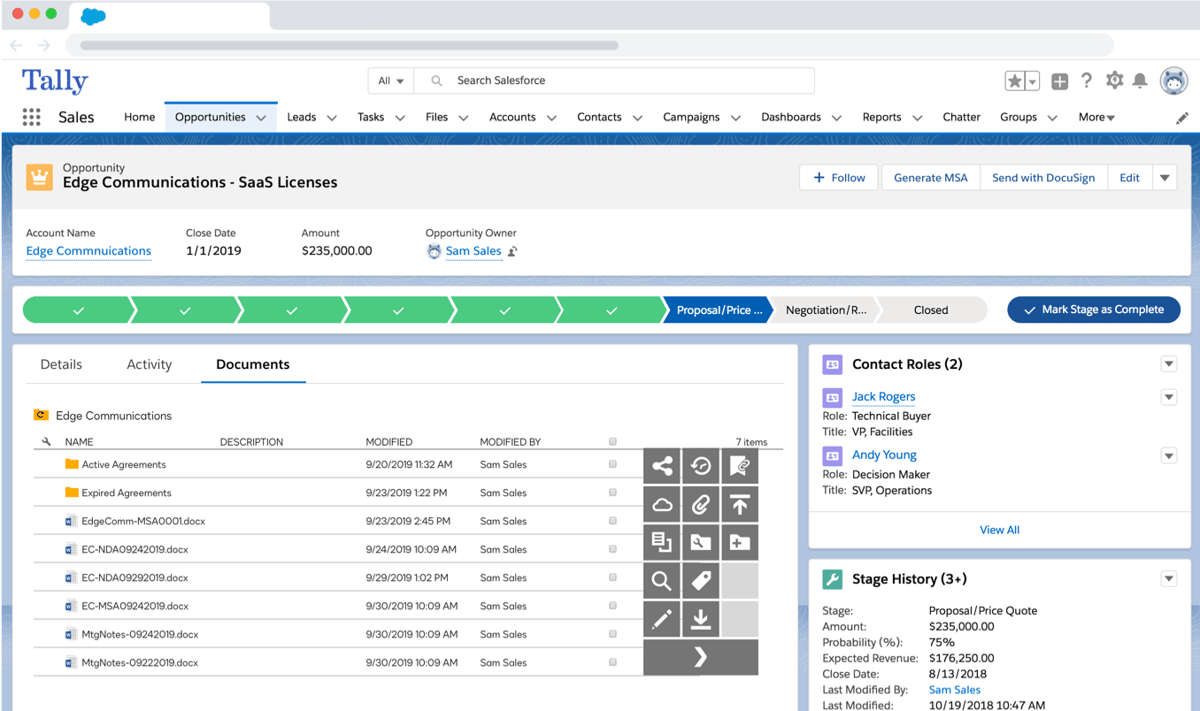
You can use it to route approvals, set contract obligations, and keep everything centralized with less manual follow-up. It’s a suitable pick for teams that need a powerful system but want to build on tools they already know.
PandaDoc is a document automation platform that aims to make the contract process faster and more manageable. It’s used for everything from third-party contracts and NDAs to complex agreements, especially when time is tight and multiple contributors are involved.
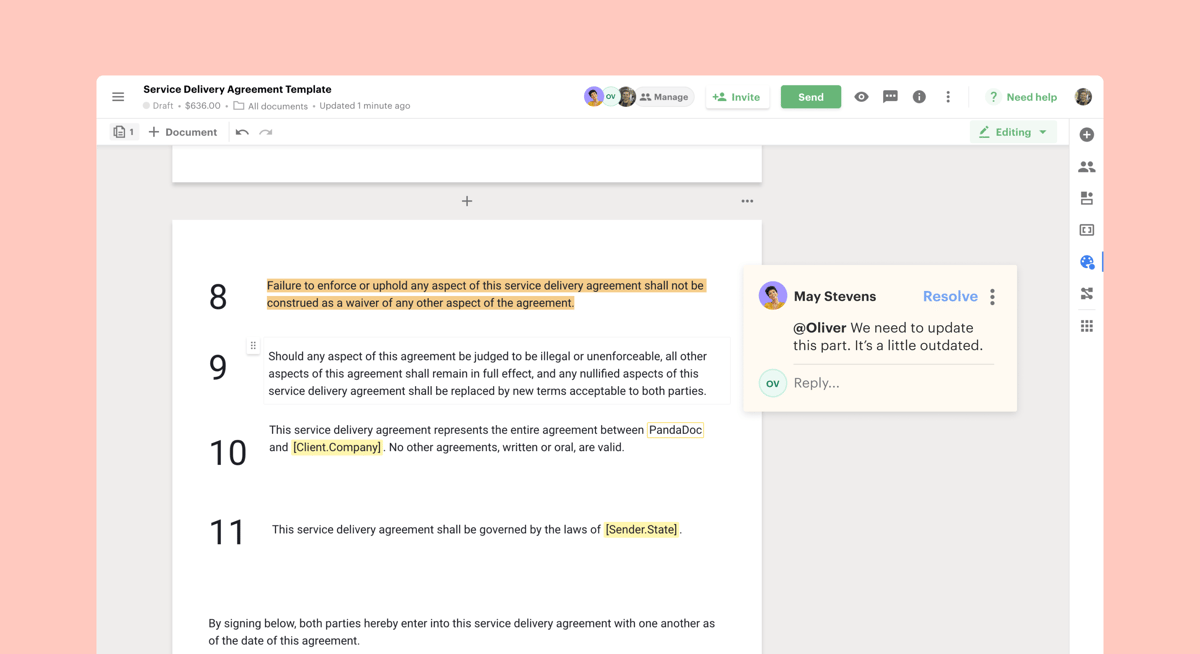
The platform combines ease of use with practical tools that reduce compliance risks and support strategic thinking.
While it may not go as deep as some legal-specific solutions, it helps users handle the time-consuming aspects of contract creation while still allowing room for human oversight.
Conga CLM supports the full contract lifecycle with a focus on control and insight. Designed for the legal industry, it allows professionals to handle both complex negotiations and everyday contract tasks while minimizing manual work.
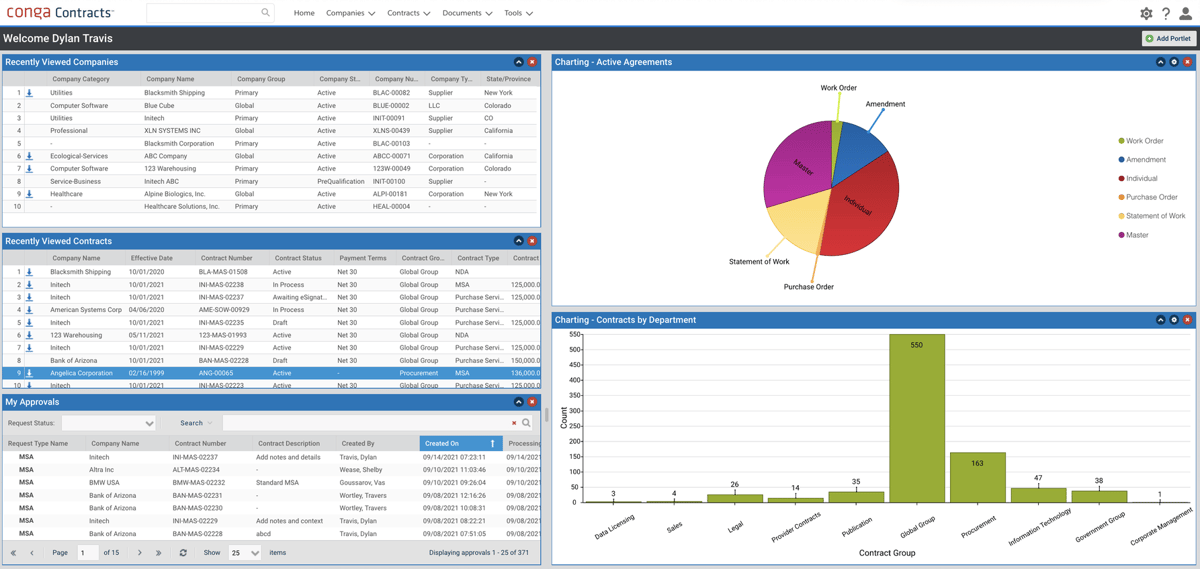
The platform coordinates everything between contract drafting and post-signature tracking. It helps legal and business teams prioritize critical tasks, automate the routine ones, and pull actionable insights from contract data.
There’s no shortage of contract tools promising speed and automation. But most stop short when it comes to what legal pros actually need: real cost savings, full control, and the confidence to move fast without compromising quality.
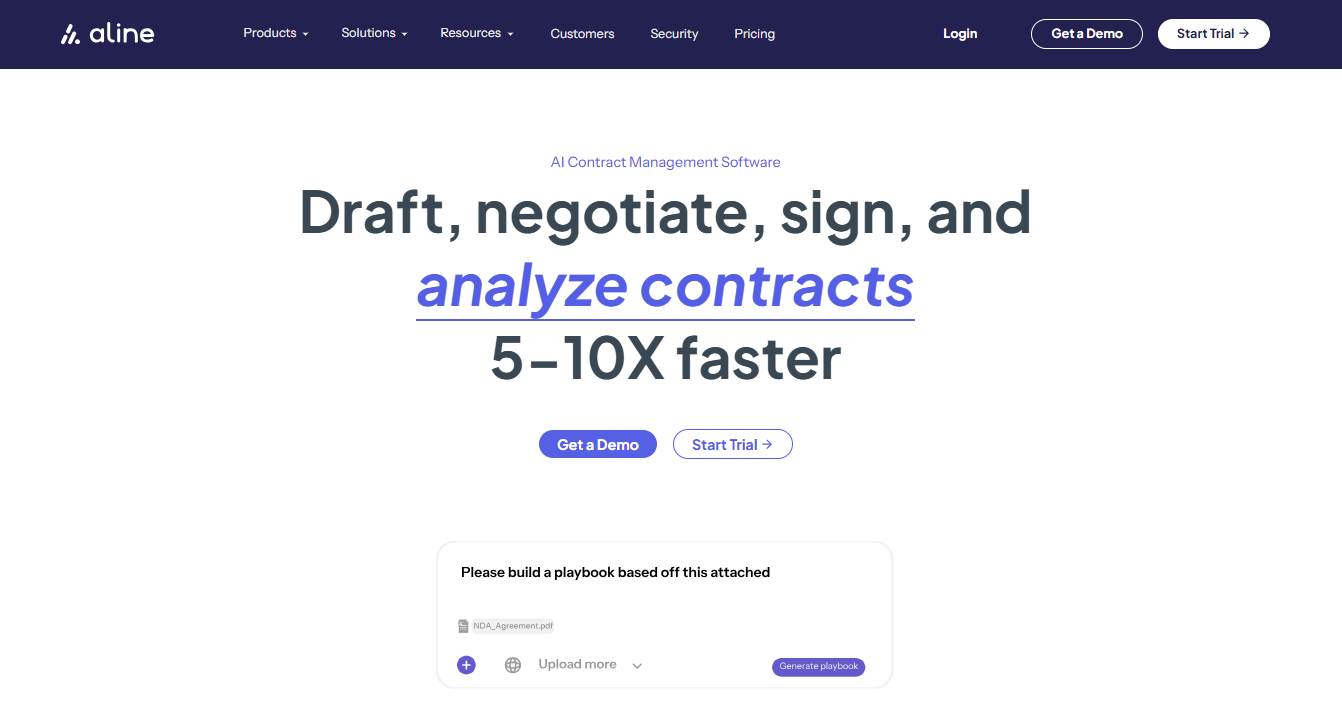
Aline is the exception that delivers on that, but it doesn't make you choose between speed and precision.
You get intelligent AI support without losing the human oversight your team depends on. You stay ahead of deadlines, cut back on manual tasks, and turn contract chaos into clarity.
Aline isn’t trying to replace your legal team. It’s built to back them up.
Start your Aline trial today and see the difference.
AI helps teams automate administrative tasks like drafting, reviewing, and approving while improving accuracy and speed. It identifies risky contract terms, flags missing clauses, and simplifies renewal tracking. AI systems also track obligations, analyze large volumes of agreements, and highlight key data for better decisions. This technology supports business growth and reduces risk by making contract handling faster, more consistent, and easier to audit.
The best AI contract management software depends on your company’s size, existing tools, and key considerations such as integration, security, and ease of use. Platforms like Aline combine AI-powered drafting, negotiation, and analytics in one solution. They help non-legal teams and procurement teams collaborate with legal departments to execute contracts quickly and maintain organizational efficiency across every stage of the contract lifecycle.
ChatGPT can help draft or review new contracts, but it shouldn’t replace a lawyer. AI can generate templates, summarize clauses, and check for missing terms, but legal expertise is still necessary to confirm that language complies with laws, industry standards, and company policy.
To use AI for contract creation, upload your existing templates or prompts into a trusted platform. The AI can build customer contracts or vendor agreements, fill in required data, and provide suggestions based on past deals. Advanced systems also offer renewal tracking and risk management tools that flag expiration dates or noncompliance issues before they become costly.
AI software increases business value through faster reviews, accurate tracking, and streamlined collaboration. It improves compliance monitoring, simplifies the implementation process, and helps maintain reliable business relationships. For organizations handling thousands of agreements, AI solutions free up teams from manual tracking while giving leadership better visibility into performance and outcomes.

